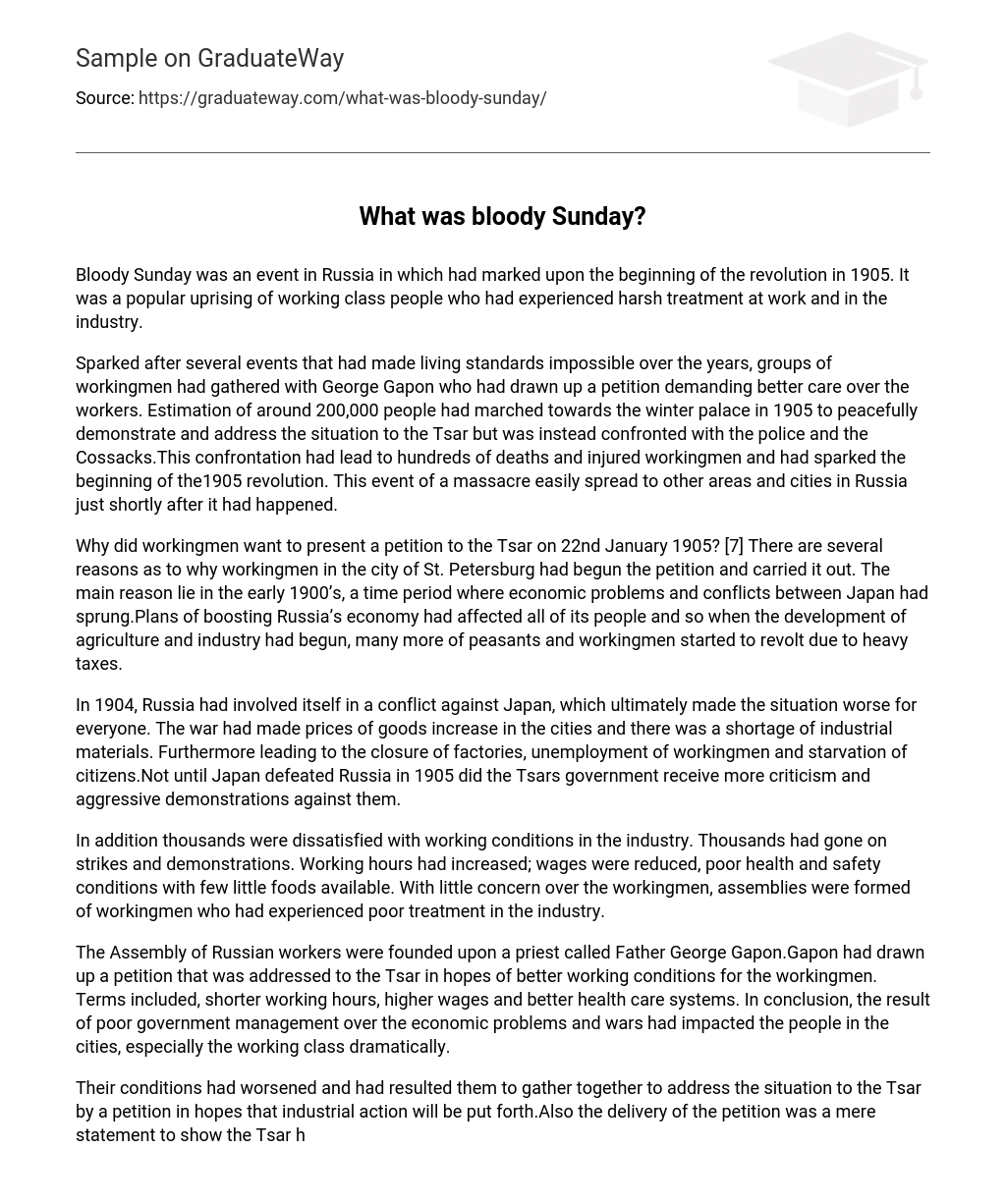Bloody Sunday was an event in Russia in which had marked upon the beginning of the revolution in 1905. It was a popular uprising of working class people who had experienced harsh treatment at work and in the industry.
Sparked after several events that had made living standards impossible over the years, groups of workingmen had gathered with George Gapon who had drawn up a petition demanding better care over the workers. Estimation of around 200,000 people had marched towards the winter palace in 1905 to peacefully demonstrate and address the situation to the Tsar but was instead confronted with the police and the Cossacks.This confrontation had lead to hundreds of deaths and injured workingmen and had sparked the beginning of the1905 revolution. This event of a massacre easily spread to other areas and cities in Russia just shortly after it had happened.
Why did workingmen want to present a petition to the Tsar on 22nd January 1905? [7] There are several reasons as to why workingmen in the city of St. Petersburg had begun the petition and carried it out. The main reason lie in the early 1900’s, a time period where economic problems and conflicts between Japan had sprung.Plans of boosting Russia’s economy had affected all of its people and so when the development of agriculture and industry had begun, many more of peasants and workingmen started to revolt due to heavy taxes.
In 1904, Russia had involved itself in a conflict against Japan, which ultimately made the situation worse for everyone. The war had made prices of goods increase in the cities and there was a shortage of industrial materials. Furthermore leading to the closure of factories, unemployment of workingmen and starvation of citizens.Not until Japan defeated Russia in 1905 did the Tsars government receive more criticism and aggressive demonstrations against them.
In addition thousands were dissatisfied with working conditions in the industry. Thousands had gone on strikes and demonstrations. Working hours had increased; wages were reduced, poor health and safety conditions with few little foods available. With little concern over the workingmen, assemblies were formed of workingmen who had experienced poor treatment in the industry.
The Assembly of Russian workers were founded upon a priest called Father George Gapon.Gapon had drawn up a petition that was addressed to the Tsar in hopes of better working conditions for the workingmen. Terms included, shorter working hours, higher wages and better health care systems. In conclusion, the result of poor government management over the economic problems and wars had impacted the people in the cities, especially the working class dramatically.
Their conditions had worsened and had resulted them to gather together to address the situation to the Tsar by a petition in hopes that industrial action will be put forth.Also the delivery of the petition was a mere statement to show the Tsar how greatly of an impact it has affected them and that industrial action must be put forth immediately. ‘The Tsar learned nothing and the people gained nothing from the 1905 revolution’. Do you agree? Explain your answer.
To an extent I do not agree with this statement that the tsar learnt nothing as well as the people. There are several indications that help suggest that they did learn something out of the revolution in 1905.Firstly, after the failure of the 1905 revolution, the Tsar had immediately appointed his troops to revenge against the people who were apart of the revolt after the publishing of the ‘October manifesto’. This just shows that he learnt that force was ideally the only method to use in maintaining control and power.
He had in addition learnt that to keep opposition to its minimum he had to introduce new policies and surface changes in hopes of keeping everyone thinking Russia was reforming for instance, the Duma.The Tsar also learnt to appoint new officials like Peter Stolypin who could help chase out any opponents as well as making agriculture and the industry more efficient within the city and countryside. New reforms were introduced in doing so, and had made efficiency much better. More factories were opened with an increase in employment.
By 1914 thousands of workingmen were working in factories and were producing lots of heavy industry like steel and pig iron. The people after the 1905 revolution to an extent did gain something out of it.They gained the knowledge that uprisings should not be only popular, but organized. In 1905, the revolution was not organized, it was just popular and so it made it very uncoordinated and ineffective.
People also gained experience out of the situation. They were able to improve their strategy and build a stronger force. In 1914, physical protests were common after Stoylpin addressed the reforms and demonstrations were bigger than ever. In 1917, when the second revolution broke out and had succeeded, it does effectively show that people gained knowledge out of their first attempt.
They learnt how to manage and scheme plans in order to succeed by the method of force. In a different sense, some people gained more profits out of the incident in 1905. 15% of the peasants in the countryside had found more wealth as they were introduced with the new reforms of making agriculture more efficient as they were looking towards the Tsars vision. This in a different view tells us that they learnt how to improve living standards.
However, there are pointers that suggest that they didn’t learn and gain anything out of the 1905 revolution. The Tsar afterall, didn’t succeed in controlling the second





